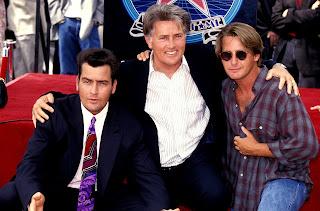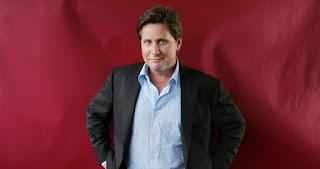
My introduction to film journalism began in October 1996, with a baptism-by-fire assignment for any Gen-Xer: a sit-down with Emilio Estevez. I was 29, had met very few celebrities at that point in my life, and was nothing short of terrified. Estevez was as important a figure to my generation as someone like James Dean was for my parents, having headlined some of the most formative films of my high school and college years. Happily, Emilio assuaged my butterflies almost instantly. Like many actors, he was diminutive in height, but made up for it with boundless energy, friendliness and his open book approach to conversation. He could sense I was nervous, and did everything he could to put me at ease. I'll always appreciate that, as had he been the opposite, my career might have ended before it began.
Emilio turns 60 today, May 12, 2022, and it's a milestone not only for him, but for all us Gen-X kids who now have AARP Cards in our wallets. Re-reading our chat below, some of my questions make me cringe a bit, feeling somewhat like "Interview 101" pabulum from a rookie (which I was), but none of his answers disappoint. Happy birthday, sir. Many happy returns and thanks again for treating a wet-behind-the-ears tyro with kid gloves back in the day.
EMILIO ESTEVEZ GOES TO WAR
By
Alex Simon
Acting dynasties are a traditional part of the Hollywood landscape: the Barrymores, the Fondas, the Carradines, the Baldwins, the Penns and, course, the Sheen/Estevez clan, all have offspring that have dotted the cinematic landscape over numerous decades.Being a member of such a tribe can be an awesome responsibility, one which grows with each successive generation, each one bearing a larger shadow from which to emerge under. Emilio Estevez is a member of this elite fraternity of players,and one who has managed to create a singularly impressive body of work along with, and outside of, his very talented family. Emilio's 25th feature film, and third directorial effort, Disney's The War at Home, adapted by playwright James Duff from his stageplay "Homefront," will open domestically in late 1996.
Born in New York City, Emilio is the eldest child of the distinguished actor Martin Sheen (born Ramon Estevez) and his wife Janet. Three younger siblings followed: brothers Charlie and Ramon,and sister Rene. Martin Sheen moved his family to the west coast in 1969, after completing work on Mike Nichols' now-legendary black comedy Catch-22 (1970). From then on, the Estevez kids were raised in Malibu, down the street from other show-biz families including the Penns (Sean, Chris and Michael) and the Lowes (Rob and Chad).The Estevez kids would team up with their show-biz kid neighbors and shoot super-8 movies between touch football games, the plots of which usually involved some sort of crime caper and lots of homemade movie blood.
Emilio and his siblings led a nomadic existence, going away with their father on location, sometimes for months at a time. This was especially true during the tumultuous filming of Francis Ford Coppola's Apocalypse Now from 1976-78. All that time on the road made a strong impression on the young Emilio,finally realizing his bite from the acting bug was permanent.
Emilio graduated from Santa Monica High School in 1980,soon landing his first role in the TV movie 17 Going on Nowhere, then winning his first feature in 1982's youth hit Tex,with Matt Dillon. The following year he appeared in Coppola's ensemble teen gang opus The Outsiders, along with other soon-to-be household names such as Tom Cruise and Patrick Swayze. Both films were based on the popular teen-oriented novels of S.E. Hinton, which helped Emilio gain a strong following among the nation's adolescent filmgoers. 1984 saw Emilio land his first starring role in Alex Cox's cult hit Repo Man, playing Otto, a cynical punk rocker who is taught the existential ropes of repossession by the venerable Harry Dean Stanton. More starring roles followed, including the quintessential suburban high school jock in John Hughes' The Breakfast Club (1984), which brought him widespread attention and critical acclaim, the confused yuppie pursuing unrequited love with internist Andie McDowell in St. Elmo's Fire (1985), and another S.E. Hinton adaptation, That Was Then, This Is Now (1985), for which he also wrote the screenplay.
Emilio made his directorial debut with Wisdom in 1986, which he also starred in and wrote. Other film credits include the 1987 hit Stakeout , in which he and cop buddy Richard Dreyfuss caused mayhem in the Pacific Northwest while keeping an eye on comely Madeline Stowe, and his scene-stealing turn as legendary outlaw Billy the Kid in Young Guns (1988) and Young Guns II (1990). Emilio stepped behind the camera and word processor again for the zany comedy Men at Work, in which he co-starred with brother Charlie Sheen.
Emilio donned ice skates and a face mask for Disney's 1992 comedy hit The Mighty Ducks , as the wily recovering yuppie Coach Bombay, who agrees to coach a group of misfit kids in hockey as community service for a DUI conviction. A sequel, D2,followed in 1994, followed by a third installment, D3, released in October, in which Emilio made a cameo appearance.
In The War at Home, Emilio plays Jeremy Collier, a Vietnam vet who's about to explode during Thanksgiving of 1972. Although he's been back in his white-bread Texas suburban hometown for over a year, his memories of the war and the atrocities he committed still haunt him. To compound an already fragile situation, his family is at their wits end with how (or whether or not) to deal with him. Father Bob (real-life dad Martin Sheen) is a self-made man whose dated values and ideals are diametrically opposed to those of his troubled son. His deeply religious mother (Kathy Bates, in a maddeningly brilliant performance), refuses to recognize that her son is a ticking time bomb as she unconsciously belittles and humiliates him. Sister Karen (Kimberly Williams), is an idealistic college student who naively thinks she understands her brother and his demons.
With The War at Home, Emilio Estevez does a masterly job of both portraying a young man at the end of his emotional and spiritual rope and telling a cinematic story that must make delicate transitions from Jeremy's stifling reality at home, and his bigger-than-life, surreal memories of Vietnam. Not since Robert Redford's Oscar-winning Ordinary People in 1980 has an American film so realistically portrayed a modern nuclear family. The family scenes are reminiscent of the best of the "Kitchen Sink Dramas" that came out of England in the late 1950's and early 60's, vividly capturing down to the smallest iota the tedium, petty arguments, and miscommunication that can tear a once-loving family apart at its very core. The final result is a shattering and emotional film experience that stays with the viewer long after the theater's house lights have gone up.
Emilio Estevez still looks considerably more youthful than his 34 years, with an easy smile, laid-back demeanor and piercing blue eyes that can either charm or bore straight through whoever they are focused on. He recently sat down during a rare moment of free time and shared his views on his family, his filmography, and how his pet project The War At Hometook three years to make it to the screen.
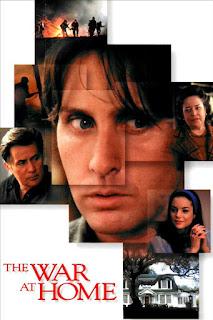
VENICE: You obviously got the acting bug from your dad. Was it sort of a natural genesis for you growing up in that atmosphere to become an actor yourself?
EMILIO ESTEVEZ: It was the sort of thing where you grow up on location your whole life, and you just assume 'Hey, this is what everybody does for a living' (laughs). It just sort of gets in your blood and you start craving that lifestyle, that nomadic existence. It's almost like being part of the circus. You go into town, set up your tents, put on a show that thrills the people, then you pack up and leave. There's something very thrilling about that. So, at a very young age I decided that this was the life for me.
The War at Home is adapted from a stageplay, "Homefront." Oftentimes, directors comment on how difficult it is translating from stage to screen. Did you find this as well?
Yes. In the play it was just the four main characters and it takes place over a day and a half. So I felt immediately that it needed to be stretched out, that we needed to see these other people in the Collier's lives. My fear was doing a "submarine movie" that would seem really claustrophobic and having people in the audience going "Oh my God, I can't wait to get out of this house!" (laughs). What I tried to do was in the first act really open it up by going into the family's life in the outside world as well as Jeremy's Vietnam flashbacks. In the second act, we opened up a little less,being more contained in the house. Then by the third act, you're feeling, along with Jeremy and his family, really claustrophobic.
You managed to pull really poignant performances out your actors, but keep it light at certain times as well. Was it difficult finding that balance?
Well, (the balance) was there in the play. But while I was banging my fucking head against the wall for three years trying to get the film made, the thing I kept hearing from the studios was "It's got no humor in it." You put this movie in front of 200-300 people, they're laughing their asses off up until the scene at Thanksgiving dinner, when things suddenly get reallyserious. I think if you have humor in a film, and it works, and then tragedy at the end, then the audience has invested more of themselves in the characters because they are identifiable, and silly, and more human.
Did you achieve that balance consciously? Did you sit down with the cast and say "Okay guys, this is what we're going for here"?
I think when you're working with such wonderful actors, the smartest thing a director can do is get out of their way. Someone was interviewing John Huston years ago and said "Mr. Huston, 90% of your films have been successful because of the casting." Huston said "Wrong son. 95!" It's true. Cast well and it makes your life easier on the set as a director and you can leave your actors alone. You go in and make adjustments when you need to, but for the most part, everyone was so spot on...my dad fought with me on a couple things, and that was a little rough, but...
Is it difficult working so closely with a family member?
Well, with my dad, if you know his politics and you know what kind of a guy he is, he's a very good man, a very saintly man and he wants everyone to love him, and that's just not Bob (Martin Sheen's film character)! Bob is sort of a shit. Bob's a bit of a villain. And my dad wanted to eliminate all that sort of archness in him. And I had to take him aside and say "No. Your character is a metaphor for how this country treated Vietnam vets when they came home. So you can't just suddenly become this shit at the end, we have to see glimpses of his shittiness throughout the film. He's this guy who's desperately holding on to these hollow 1950's ideals that a man's home is his castle, which is bullshit!
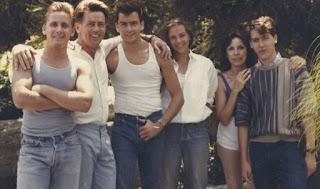
The Sheen/Estevez clan, circa 1980s.
What is the best thing and the worst thing about working with a family member?
I have a lot of my family in this film. In addition to my dad, there's my sister Rene, who plays my cousin during the Thanksgiving scene. My daughter Paloma is in the final scene with me. So, the best thing is you have a shorthand that's already established. You can say "Okay, I'm looking for this, or looking for that." Also there's an element of trust. My dad knew that, as a filmmaker, I wasn't going to embarrass him, or take him to a place so personal that I wasn't willing to go there, either.I was willing to go anyplace he or any of the other actors were willing to go. The worst thing is, there were times he'd argue with me, and I'd be like, "Wait a minute, is this the actor fighting me, or the father fighting me?" Because if it was the father, then it's a whole different dynamic. So there were times that I'd really have to step back and delineate what I was up against. The odd thing about being a director is you're not really allied with anyone. The crew resents you because you make them work obscene hours and the actors resent you because usually they think they can do your job better than you, but they don't want to deal with the headaches and the hassles of it. So at times, you're really at sea. It's the loneliest and yet the most gratifying job in the world. It's a truly dictatorial position, probably one of the last in the world. So one the one hand it's a very creative outlet, and on the other it can be a mess of headaches and a total nightmare. I can't wait to do it again!! (laughs)
Were you and Charlie ever up for the same roles?
Platoon. I had a couple lunches with (director) Oliver (Stone). I remember sitting at Hugo's, talking with him, and saying "Oliver, no one's gonna see this movie! It's too tough, too graphic!" (laughs). At that time I was writing a lot, trying to direct my own movie, so it wasn't where my head was at. Then, a couple months later when all the financing came together, Charlie had the lead! But that was also at a time when I was really trying to separate myself from my dad, trying to use my own name, but still every article started with "Emilio Estevez, Martin Sheen's son..." so it was driving me insane. Apocalypse was still fresh in everyone's mind at that point, so I thought, the last thing I should do if I wanted my own identity, is make another Vietnam film!
What's the most important message The War at Home has to offer?
First, the movie is about a dysfunctional family in crisis. So it's something everyone can relate to. On another level, it's about this Vietnam vet who's going through Post-traumatic Stress Disorder and really just...needs a hug. Second, maybe for people to look past the surface when you see these guys by the side of the freeway with the 'Homeless Vet' signs, what they've gone through, how they've served the country, because there are really no programs anymore to take care of these guys. On another level it's about what happens when there's an absence of love in a family, when people give each other what they think they want, instead of what they really need.
How did you come by the material to begin with?
Three years ago my dad did a play reading of "Homefront" at my sister's house, and urged me to check it out. After I read the material I was blown away by it and knew that I had to bring it to the screen. And that's where the fun began! (laughs) So out of my pocket I financed it and hung in there until we finally got it made. Initially, there was literally no one in town who wanted to make it. They felt there was no humor in it, that we'd explored this avenue before in other films. And, most important of all, you couldn't make a theme park ride out of it! You're not gonna see The War at Home action figures (laughs) any time soon! So finally, Disney wanted me to be in Mighty Ducks 3. I agreed to do that for free, if they'd finance War. Disney put up three million for domestic and Brad Krevoy and Steve Stabler at MPCA put up the additional 1.2 million for foreign. So it all worked out in the end.
Do you prefer working in film/TV/theater?
Film, absolutely. I'm a huge movie fan. I love going to the movies. I'll see five or six movies a week, if I have the time. I rarely go to premieres. I just love sitting with an audience of genuine fellow film lovers sharing the same experience. Not even great leaders can hold a captive audience in the dark like a movie can.
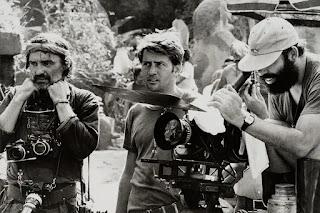
I'm going to throw out some names, and if you have any stories or memories, fire away. Apocalypse Now...
I was over in the Philippines with my family about five or six months. When the reviews came out, they were mostly bad and my father told me "This film won't be appreciated for another twenty years. And people will be talking about it for the next twenty years and twenty years after that." As far as my memories on the set, I was 14 years old, with no adult supervision for the first time in my life. In the Philippines! I went nuts. It was like a big playground. I was an extra on the film and I actually had a line that was cut out, at the Do-Long Bridge sequence. So for three weeks as a 14 year-old, I got to play war! Pretty exciting...
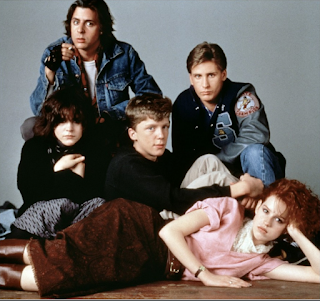
The Breakfast Club.
My first commercial success. The movie is still finding an audience even today. Kids come up to me on the street now who are 16 or 17 years old, and tell me that it's their favorite movie! It's so cool. I guess we addressed a lot of things in the film that are universal and still timely today.
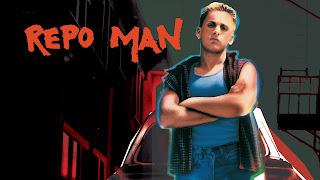
Repo Man.
I'm still trying to figure out what that movie is about! (laughs). Alex Cox is a real genius, a madman. I was just kind of along for the ride, but I can see why it became such a big cult film.
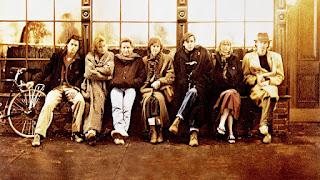
St. Elmo's Fire.
Great memories. A lot of the same people from The Breakfast Club and other friends were in that, so it was just a real comfortable, warm experience. A lot of fun to make.
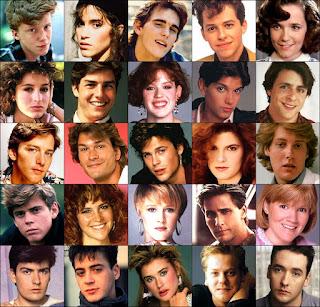
Three words: The Brat Pack.
(Groans) Why does that keep coming up? People still want to talk about it, 12 years later...It profiled us as a bunch of irresponsible punks who didn't take our work seriously and didn't give a shit, while I always felt I was the antithesis of that. I mean, I was optioning scripts at 19. I took what I did very seriously, so I felt this was a real slight. That guy David Blum (the journalist who coined the term "Brat Pack"), if I ever see him on the street, he'd better hide!
Do you have a favorite story about working with your dad or with Charlie?
(Pause) Not fit for publication! (laughs).
